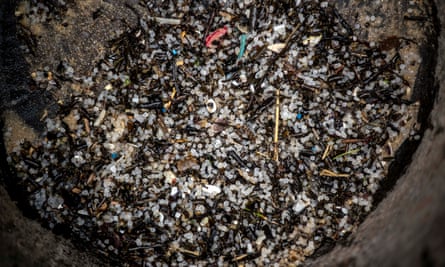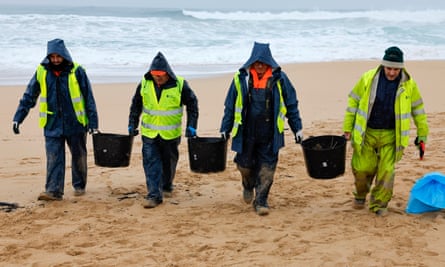Officials in northern Spain have issued alerts after millions of tiny plastic pellets spilled by a cargo ship off Portugal last month washed up on beaches, raising fears of environmental damage and triggering a political row.
Spanish state prosecutors have also launched an investigation after receiving information suggesting the non-biodegradable pellets could be toxic.
The emergency began on 8 December after the Toconao, a Liberia-registered vessel chartered by the shipping firm Maersk, lost six containers while sailing about 50 miles (80km) off the coast of northern Portugal. One container held 1,000 25kg sacks of the tiny balls, which are used in the manufacture of plastic products.
In the weeks since the spill, millions of the pellets have washed up on beaches in north-west Spain, prompting a clean-up operation by regional workers and volunteers.
On Tuesday, the regional governments of Galicia and neighbouring Asturias issued level 2 alerts, which will allow more personnel and resources to be assigned to the task as well as logistical assistance from the Spanish government’s environment and transport ministries.
Alfonso Rueda, the regional president of Galicia, said there was still time to stop more pellets washing up on the shoreline. “There are hundreds of sacks right now that have not reached the coast,” he said on Tuesday. “The time to collect them, or at least to try, is now that they are at sea. It seems there will be currents these days that will make it a little easier.”

The regional government of Asturias said it has raised the alert level after detecting “a significant increase in the strip of coast affected and an increase in the number of spots identified”.
The incident has led to a political row between Galicia’s conservative regional government and the socialist-led central government. Rueda said the central government had known about the spillage for two weeks before it informed his administration on 4 January. The Galician government has also said it is satisfied that the pellets are not toxic.
Asked why he had waited so long to secure central government help by declaring the level 2 alert, Rueda said his team had found out about the situation only “a few days ago”, while the national government “has known the details for a month”.
Spain’s environment minister, Teresa Ribera, had previously said the government was ready to help as soon as its assistance was sought.

“The pellets have reached beaches in Asturias,” she said in a tweet on X on Monday. “I’ve called the regional president and told him – just as I told Alfonso Rueda yesterday – that the government is available to help. Our teams are ready to respond as soon as they’re called on.”
Voters in Galicia go to the polls next month in a regional election. As the political squabbling continued, ecological groups called for a quick and coordinated response, saying the situation was already reminiscent of the confused reaction to the disastrous Prestige oil spill in Galicia two decades ago.
In a joint letter, Friends of the Earth, Ecologists in Action, Greenpeace, SEO/Birdlife and the WWF said there could be “no repeat of the nightmare management of an environmental crisis”.
“Environmental organisations are monitoring the Galician regional government’s reaction to the spill with concern as it serves as a bitter reminder of the black tide of the Prestige in 2002 and 2003 and the lack of coordination with the central government,” the letter said.
“We ask that no partisan use is made of the catastrophe and that joint efforts are made to tackle the long-term impact of the spill, to determine responsibilities, and to reinforce the rules on the production, transport and use of plastics.”
The European Commission warned of the dangers posed by plastic pellets three months ago.
“Once in the environment, these small particles of plastics do not biodegrade and cannot be removed,” it said in October. “They accumulate in animals, including fish and shellfish, and are consequently also consumed by humans in food. They contribute to the pollution with microplastics, which have been found in marine, freshwater and terrestrial ecosystems as well as in food and drinking water.”
